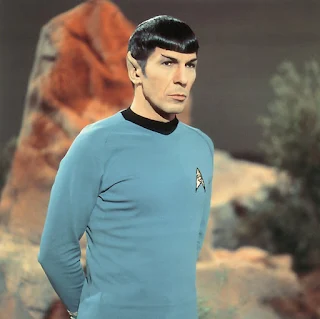“Hope is a passion for the possible.” Søren Kierkegaard
The characteristics of a utopian future suggested by the Star Trek saga are extrapolations based on dramas enacted as television episodes and movies (especially the original Star Trek series and Star Trek:The Next Generation, both produced by Star Trek creator Gene Roddenberry, as well as the first 10 feature films guided by his advocacy.)
Such extrapolations were made by fans and observers since Star Trek’s debut in 1966, and articulated by various participants in creating these stories. These ideas and ideals were and to some extent still are as important and well-known as the stories and characters themselves—another unusual if not unique feature of the Star Trek phenomenon.
An important consequence of these extrapolations is that many devoted fans not only look to the realization of Star Trek ideals in the future, they see them as guides to their own futures and their own lives in the present.
But Star Trek is not a utopian blueprint. It is a saga of dramatic stories realized as television episodes and feature films that has an underlying utopian purpose.
The need to tell these stories through recognizable characters in a visualized, walking and talking future can been seen to dilute that purpose, but it also provides power and persuasiveness to the vision.
Star Trek stories were different from the beginning.
Following the main dictim of Lajos Egri’s classic text, The Art of Dramatic Writing (Gene Roddenberry’s writing bible), each Star Trek story needed a unifying theme. Roddenberry insisted the stories had to be about something. But they could not simply propose ideas. They had to dramatize them in recognizably human terms, and follow their implications to some conclusion, while the futuristic elements and space aliens provided enough distance to see these issues and ideas more clearly, without reflexive contemporary judgments. These goals were not always met. But enough episodes fulfilled this mandate well enough to produce provocative results that can still resonate.
As the original series saw its budgets diminish, episodes often became little morality plays, outer space allegories. The larger effects budgets of the Next Generation allowed that series to expand and illustrate, particularly in depicting the society of the starship Enterprise and the Federation. It more fully modeled the future it advocated.
Still, the same storytelling protocols applied—stories had to show how enacted ideals might look, and the problems they might encounter, and some of their consequences. Modeling the future included how these 24th century people might respond and behave.
Star Trek’s basic storytelling move is more than symbolized by one of its iconic characters.
As characters, the original series Star Trek crew was fairly familiar, from westerns, sea stories, previous space adventures and earlier tales. There was the heroic captain, as intrepid and courageous as Hornblower, as wily and curious as Ulysses, with a bit of JFK’s charm, dash and purpose.
There was the crusty country doctor with a heart of gold, the comely communications officer, the steady helmsman, the eager young ensign, the frantic Scotsman in the engine room eking out his mechanical miracles.
But one character was unusual, if not unprecedented for television: Mr. Spock, science officer and second in command. In many ways he was an original. He wasn’t the sidekick, like Matt Dillon’s Chester. He wasn’t just the brain who supplied the cool gadgets, like Tut to Captain Midnight. He wasn’t the antagonist either, the inside enemy who tries to undercut the hero, like Othello’s Iago. He was loyal, he was a friend, but he was Other. He was the alien, but on the inside.
He was a different voice.
Spock was half-human, half-Vulcan, raised in an alien culture, with different abilities and a different way of seeing things, including how he saw human thought and behavior. He provides a unique and different point of view, not captive to human emotional (also meaning unconscious) responses. In general, he represented consciousness.
The stereotypical space alien is cardboard evil, and so alien Spock, like actual Others to any Us, is suspected and feared in early Star Trek stories. These responses were revealing, with obvious human application. Some acceptance of Spock led to the heresy that all unknowns are not therefore "things."
As played by Leonard Nimoy, Spock quickly became Star Trek’s most popular character. Nearly every Star Trek incarnation has a Spock-like character—notably, Data, the android aspiring to be human, on the Next Generation. And lots of other television series since, including those not set in outer space, include a Spock/Data character. (One way to spot them: they don’t use contractions.)
Moreover, Spock as alien was not merely assumed—his differences were a constant source of dramatic and humorous dialogue and incident, a mutual exploration of what it means to be human. This continued as the character of Spock (and Data, etc.) evolved in response to events and experiences.
Beyond the useful banter, what made the Spock character work was the relationship with William Shatner’s Captain Kirk. Their contrasting temperaments and styles added spark, but it was Kirk’s reliance on Spock’s point of view (and special skills) and their growing friendship that gave the series the ability to evaluate from more than one perspective.
Illustrating the differences expanded with the addition of Dr. McCoy, who often represented the more emotional view. Together, Spock, McCoy and Kirk harmonized thought, emotions and intuition or physical impulse towards action; they formed a dynamic combination of mind, heart and spirit that some 20th century writers like Thomas Moore and James Hillman considered the constituents and activity of the human soul.
Though as half-human and half-alien (from the planet Vulcan), Spock was the ultimate Other to both races, his point of view was Vulcan, a once warlike culture that devoted itself to the rigors of what it called “logic,” avoiding judgments based on emotion. (This is similar to the cultural history of Tibet, where a warrior nation transformed itself totally based on Buddhism, to which Vulcan’s “logic” is closely related.)
Through Spock, the viewer might see humanity from the outside. It is this stepping back that is the basic move of much science fiction and all utopian and dystopian tales. Seeing things from a different point of view is both the preliminary and the result of empathetic “walking in someone else’s shoes.”
Beyond Spock, this point of view from outside is the key to many of Star Trek’s stories, themes and insights. While aficionados might be interested in specific episodes and films as examples, what follows is a more general outline, somewhat elaborated but perhaps still lacking in nuance, of Star Trek’s utopian vision, its contribution to utopian storytelling and to the soul of the future.
1. Infinite Diversity in Infinite Combinations
A value recognized from Star Trek’s start, the saga’s dramatization of the utility of diversity is now its most identified and (in more recent stories) most consistent feature. This is another thread woven by the Spock character, who championed diversity as part of his logic. The genius of Spock as a character was partly in the emphasis on him as an alien, for in 1960s terms he was not the only alien on the Enterprise bridge.
Other characters may have been familiar, but not always the people who played them. As the communications officer, Nichelle Nichols was only the second Black woman to play a regularly recurring role on a primetime television drama (the first, just three years before, was the celebrated and recently deceased Cicely Tyson, in “East Side West Side,” a series about social workers starring George C. Scott that survived for only one season.)
Black women had previously appeared mostly as servants, and that was also the case with Asian men. At one point in his theatrical career, George Takei refused such a role, and paid for his principles by needing to take a job as an actual servant to make up the income. On Star Trek, he was an officer, and the skilled and reliable helmsman, before later becoming a starship captain himself.
But while Spock’s differences were highlighted, Lt. Uhura and Lt. Sulu were simply bridge officers doing their jobs. Together they lived and breathed the point that competence is not race or gender-based, and that diversity adds to the available talents and perspectives.
Now that some previously unthinkable diversity does exist in professional circumstances, Star Trek continues to expand the concept. It is also arguably where its influence has encouraged a condition of our time, which is in fact the original Star Trek series’ future.
Leonard Nimoy often said (and he said it once to me) that Star Trek is basically about a group of people solving problems together. Infinite diversity in infinite combinations represents not only a concept of beauty, but the best, most practical chance for an actual future.
2. Respect all life.
 |
Enterprise discovers a tiny intelligent lifeform
that refers to humans as "ugly bags of mostly water.' |
Its conscious championing of diversity, and the relationship to the Other as a key to social evolution, became in Star Trek stories a commitment to respecting all forms of life and civilizations, and its grappling with these ideals in specific situations became its drama.
It is a key as well to reducing conflict. “The continuing mission of the starship Enterprise has been to take us out of the smog of fear and hate into an open space where difference is opportunity, and justice matters, and you can still see the stars," wrote Ursula LeGuin. "Violence on the Next Generation is shown as a problem, or the failure to solve a problem, never as the true solution."
3. We are not invaders-- we are explorers.
When Captain Picard said these words (defining the essential meaning of what Star Trek fans know as the Prime Directive), he was announcing a profound change from most of human history, in which exploration led directly to exploitation and conquest.
Science fiction writers like Ray Bradbury dramatized the repetition of this pattern on other planets, but Star Trek portrayed the implications of its reversal--and the temptations to revert. This purifies and exalts the human drive to explore and to learn, and through the exuberance of Captain Kirk and Captain Picard, portrays exploration without exploitation as joyful fulfillment.
While the Prime Directive has been reduced in common terms to “non-interference,” it is really a commitment based on that respect for the Other as the respect for life in all its forms. Though Star Trek stories seldom explored it, this respect for life applies to our natural world—indeed, since most of this storytelling is allegory about Earth—this is its primary application: not just to other humans and their civilizations, but to the non-human on Earth.
3. Making money is not humanity's prime directive.
A future without money was sometimes played for laughs, but it is one of Star Trek's most subversive ideas: people will work to "better themselves and the rest of humanity" (in Picard's words) without being paid. Even though everyone's material needs are met (some have argued since the 60s this is entirely possible now, even without Star Trek’s technological magic), it doesn't lead to laziness but to liberation. "When you take away the need to make a living, a lot of other things are possible," said Star Trek producer Jeri Taylor.
Our myth of money, which Lewis Mumford calls "the most dangerous of modern man's hallucinogens," was not present in all of our past. Sociologist Max Weber argued that the acquisition of wealth as an ethically superior motivation didn't appear until the 17th century. It doesn't need to be--and perhaps cannot be--in our future.
Today aspects of Trekonomics are being taken more seriously, as concepts like the guaranteed income that faded after their late 60s and early 70s origins, are being advocated again, and the U.S. government took the unprecedented step of sending money directly to American citizens, with more positive than negative consequences to the economy. But the most important element is reorienting value.
4. The future is an adventure.
When Star Trek began, this was perhaps its most bracing vision. The future isn't something to fear or to desire. It is not predetermined by fate or selfish genes. It is something we go out to meet, with heart, soul and wonder.
"Back in the 60s, most science fiction was about people who weren't on earth because they were escaping it, it was so overpopulated and polluted that people couldn't live on it, or it was a charred cinder because we'd screwed ourselves over," explained Michael Malotte, president of an international Star Trek fan organization. "Gene's Star Trek was really the first science fiction of its time to show a future where we actually learn from our mistakes. We bettered ourselves and we banded together, and we headed out for the stars.”
The cliche is that Star Trek offers an optimistic view of the future. It is optimistic in positing that humanity survives, but perhaps its greatest optimism is in the possibility that “we actually learn from our mistakes.” But that won’t happen unless we want it to, and are conscious of its value. Which implies the final propositions of its utopian vision:
5. For a better future, we must become better people.
Star Trek brought together believable future technology with identifiable human behavior, but it also modeled a vision of the future where standards were higher, and struggling with ethical issues was central. "To be good," novelist Iris Murdoch suggests, "it may be necessary to imagine oneself good." Bigger challenges require that we fulfill more of our potential, or we may never get to that future. This potential is based on qualities we already have, such as courage, kindness, empathy, self-awareness and other qualities of mind, heart and spirit that when orchestrated result in what we call soul.
6. The journey out is the journey in.
Because Star Trek's humans had to see themselves through the eyes of the aliens they encountered, they learned to value self-examination on all levels—as individuals, groups and as humanity as a whole. Star Trek also presented technology in human terms, another crucial connection, for the importance of technology is in how it is used, and technology follows psychology. In the Next Generation particularly, the roles of art, mortality and human relationships all became central to the voyage.
"...space is not the final frontier," wrote Star Trek and science fiction writer David Gerrold. "The final frontier is the human soul."
The Star Trek future has been interpreted in many ways, not all of them likely to be helpful to the actual future. And Star Trek itself is not universally accepted or taken seriously. It is met most often with either admiration or disdain, devotion or incomprehension. (Other science fiction utopians are themselves divided on the subject: Kim Stanley Robinson has little time for Star Trek, but as we’ve seen, Ursula K. LeGuin has praised it.)
But it can hardly be disputed that Star Trek has penetrated global cultures over at least a half century.
Near the height of its popularity and ubiquity in the 1990s, it was estimated that at least a quarter of the world’s population would recognize a photo of Captain Kirk. That’s more people, just before the cellular age, than had a telephone. Even today, terms like warp drive, prime directive, “red alert,” “beam me up”...are part of a common vocabulary. More people recognize Klingons and Vulcans than members of actual nationalities.
So the Star Trek saga has been so well known and has deeply influenced so many people that it is the most important example of utopian storytelling in our times.
The saga’s sheer number of stories makes it the most elaborated utopian vision of our age.
In terms of a utopian vision, the Star Trek future was at its best a model, a thought experiment that said: what if society consciously institutionalized the best human qualities, while guarding against its worst? What if we actually learned from our bloody mistakes, so the cruel excesses of history were not all in vain? What would that look like?
In the ongoing present, that looked, for one thing, like hope. Unfortunately, in popular storytelling, Star Trek remains nearly unique in modeling a hopeful future. Other visions of how our technological society transforms itself to overcome ecological self-destruction are perhaps bound to be in more detailed forms, such as recent novels by Kim Stanley Robinson.
But as a utopian future driven or at least enabled by technology seems to recede in probability, it may be useful to turn to a different kind of utopian vision—one that would serve a technological society, but more likely, a society in which high technology is much less important, or even non-existent.
One such vision is rooted in the continents that once represented the future: the Americas. And though these roots are ancient and global, one of the first cultural expressions of this vision erupted in the 1890s, at about the same time that H.G. Wells was envisioning The Time Machine. But this time it was not in London, but in the American West.
Next time: The Ghost Dance Future



























